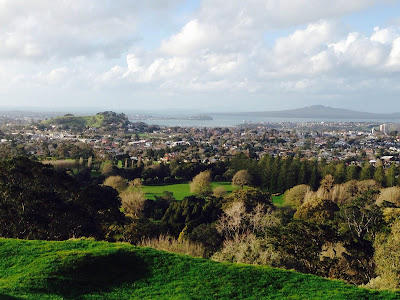(In old-timey radio announcer voice, or this kid on a busy 1920s New York corner):
Extra! Extra! Read all about it - AUCKLAND IS A TICKING TIME-BOMB
That's right, Auckland is neatly situated upon a monogenetic volcanic field comprised of 53 volcanoes.
 |
| I'm no cartographer, but red probably isn't a good thing. |
Until reading that Wikipedia page, I had thought all of these volcanoes were extinct, like the terrifying moa,
 |
| Moas could grow over 12 feet, 500 lbs, and had no wings! This type of chart is how all sizes should be compared. |
or the Haast's eagle.
 |
| The eagles are coming! Someone invent a time machine and film "Planet Earth" a million years ago, thanks. Yeah that's the only use of a time machine I would have. |
Instead, I have found (more terrifyingly) that these volcanoes are still capable of erupting and are likely to erupt within the next "hundreds to thousands of years." A random certainty? An uncertain definitive? I say a time-bomb indeed.
As seen in many other parts of the world, the threat of natural disaster does not really dissuade anyone from moving to Auckland. In fact, Auckland is expected to grow by about a million people in the next thirty years. This isn't a surprising number, as population within cities worldwide is increasing rapidly. But it does bring up the question of coping with living in an inevitable natural disaster zone. I've been thinking about this a lot since a recent trip to Portland, OR, just days after this New Yorker article scared the bejeezus out of everyone there.
Being from the Midwest, where the worst natural disasters are school closing (hurray!) / flight delaying (not hurray) heavy snows, it's a bit difficult to wrap my head around. The same question just keeps popping into my head, "Why would someone choose to live somewhere in such potentially imminent peril?" Moreover, the solution is distinctly simple - just leave. Of course there are a plethora of answers to my question: family, familiarity and careers being most prominent.
I suppose some aspects of natural disaster risk, as with many other things in life, are relative. It's much easier to rationalize moving to a city with an inherent risk of natural disaster by comparing it to place with an even higher risk. "At least we aren't moving to the Pacific Northwest, or Santiago, or most places in Japan." And that's fair, because a lot of places are at a much higher risk than New Zealand Kiwis, which have little else to worry about (except housing prices and sandfly bites, I guess). The relative safety argument is mostly just hiding behind a false veil. Risk rationalization ultimately comes from peoples' comfortableness and terrors regarding change.
But this is all rather dour of me. "Where are the pictures of cool things, Eric?" I'm getting there...
Perhaps the place in which these delusional people live have so much to offer that the immediate benefits outweigh the 'sometime-in-the-future-but-an-inevitability' risks. Auckland's volcanoes supply a physical example of this dichotomy of thought. Yes they will erupt again someday, but now they provide beautiful hikable and climbable green space locales with wonderful city vistas. I've taken it upon myself to showcase a few here:
 |
| Mt. Hobson looking north as dusk and a storm roll in. |
 |
| Mt. Eden - a mere ten minute run from my flat, providing towering views of nearby volcanoes... |
 |
| ...and the occasional double rainbow. |
 |
| From atop One Tree Hill looking north, which in addition to being a U2 song and teen drama, has a pretty interesting history. Mt. St. John middle and Mt. Eden right. |
 |
| One Tree Hill north-northeast. |
 |
| Looking up at the One Tree Hill obelisk. Sheep in their native habitat. So. Much. Green |
 |
| So. Much. Cute. |
Cheers!
No comments:
Post a Comment